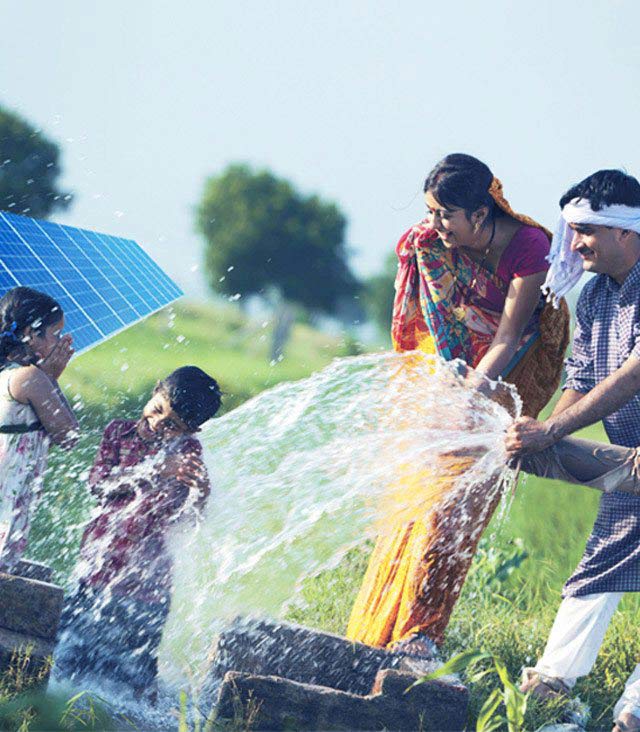- PROJECT SIZE:
431MWp DC Solar Project
- Project type:
Solutions for Power Producer
- Project Bifurcation:
431MWp DC/330 MW AC
- Project completion time:
17 Months
- No. of modules:
765,408 Nos.
- CO2 Offset:
7,80,300 tonnes of CO2 annually
- Module Technology:
560 Wp and 565 Wp Bifacial Glass to Glass module
Project Overview:
The 431 MW DC solar project is located in the Neemuch district of Madhya Pradesh. The project is spread over 1635.63 acres of land and makes use of single axis tracker and bifacial glass to glass modules.
Objectives:
The key objectives behind implementing this project include:
- Combination of Single Axis Tracker and Bi-facial module: Establishing a system which uses a combination of single axis tracker and bi-facial module.
- Reducing Carbon footprint: Reducing Carbon foot print by achieving CO2 offset of 780,300 tonnes per year
- Project and SCADA commissioning: Ensuring that the project commissioning and SCADA (Supervisory Control And Data Acquisition) commissioning took place simultaneously for maintaining highest safety standards.
- Seamless SVG Operation: Ensuring that the project was CEA compliant, which led to seamless application of SVG.
- Supply to Western Central Railways and MP Power Management Co. Ltd.: To ensure continuous power supply to Western Central Railways and MP Power Management Co. Ltd.
- WRLDC Compliance: Ensuring that the system is WRLDC compliant through the innovative combination of SVG and harmonic filters.
Key Project Features:
- COW: This is one of the breakthrough technologies that has been implemented in this site. The Conduit on Wire Technology (COW) has helped the company in cost cutting. This technology ensures complete protection of LT cables as the wire is neither below ground nor directly above the ground. In this case the wire is hanging on a GI wire, which ensures complete safety. This avoids unnecessary damage owing to underground or just above the ground wire placement.
- SVG: This is the first solar project site in India where the SVG technology has been implemented in the first attempt. This lead to massive increase in the speed of implementation of the project.
- Harmonic Filter: This project makes use of the harmonic filter technology. The implementation of the harmonic filters ensured no impurity in electricity.
- AC DC ratio of 1:3: An AC DC ratio of 1:3 ensured that the efficiency of this system further increased. This leads in much better power generation.
- Marble Dust: The project made an innovative use of marble dust. Owing to high luminescence, the marble dust increases the intensity of reflection which will ultimately increase the generation capacity.
Critical Challenge Analysis:
- Rocky Terrain: The land was a rocky terrain. This led to lots of challenges while digging the land.
- Line Readiness: The line readiness was a challenge. Taking the transmission upstream was a challenge. Therefore, the engineers had to focus on polling station and transmission line as well simultaneously.
- Remote location: As the project was outside the scope of industrial area, vendor management and development was a challenge. Additionally, during the rainy season, it was difficult to work on the site as the ground was not supporting free movement of workers.
Innovation Highlights and Impact:
This is first solar project site which makes use of a combination of tracker and bi-facial modules. This combination ensures that the efficiency of the entire system went up by more than 15%, which led to peak power supply for relatively increased number of hours. The HT cable was also put into ballast which led to continuous supply of power even during challenging weather conditions.
Conclusion:
The project highlights the highest level engineer standards as per which the 431 MW DC solar project has been made operational. The project is also one of the finest examples of how the technical prowess led to the development of one of the best solar power projects in the current times despite being offered a relatively lower biding price.
- PROJECT SIZE:
125.84 MWp DC, Omkareshwar Floating Solar Project
- Project type:
Solutions for Power Producer
- Project Bifurcation:
125.84 MWp DC
- Project completion time:
26 Months
- No. of modules:
213,460 Nos.
- CO2 Offset:
173893 tons of CO2 emissions annually
- Module Technology:
585-595 Bifacial Glass to Glass module
Project Overview:
The 125.84 MWp DC Omkareshwar Floating Solar Project demonstrates the successful integration of advanced floating solar technology at Madhya Pradesh's Khandwa district. The project showcases advanced floating technology by utilizing flexible mooring with dead weight anchoring and IFP barges. The installation of Ferro cement Inverter floating platforms, covering 258 square meters, is the largest of its kind, marking a significant milestone in floating solar technology.
Objectives:
The key objectives behind implementing this project include:
- Successfully implementing large-scale floating solar technology with innovative anchoring solutions in challenging reservoir conditions, and world's largest Inverter floating platform.
- Providing sustainable power supply to MPPTCL (Madhya Pradesh Power Transmission Company Limited) and minimizing land use
Key Project Features:
- Industry-leading Inverter floating platforms(IFP)
- Robust anchoring and mooring system ensuring platform stability in variable conditions
- State-of-the-art monitoring and control systems for operational efficiency
- Six Sigma quality control implementation for floater manufacturing standards
- Integrated wave management system for equipment protection
- Advanced weather monitoring and response protocols
Critical Challenge Analysis:
- Hydrological Complexity: The project faced unprecedented challenges due to reservoir water level fluctuations. Our technical team developed custom wave breaker systems capable of withstanding these extreme conditions.
- Logistical Orchestration: In a remarkable demonstration of project management, the team navigated the complexities of transporting 213,460 bifacial modules and 258 square metre IFP to a remote location.
- Technical Integration Paradigm: The team pioneered the deployment of ballastive IFP barges - the largest of their kind - housing critical AC equipment. This engineering feat required meticulous calculations to ensure perfect buoyancy while maintaining structural integrity under varying load conditions.
- Environmental Adaptation Strategy: Water-based operations presented unique challenges for the bifacial glass-to-glass modules. The team developed innovative cleaning protocols and anti-algae treatments, ensuring the projected annual generation remained achievable.
- Safety and Maintenance Protocol: Working over water bodies necessitated the development of specialized safety protocols. The installation of floating security cabins created safe zones for maintenance crews, while advanced monitoring systems were implemented to track structural integrity and performance metrics in real-time, ensuring optimal operation throughout the 12-month installation period.
Innovation Highlights and Impact:
The project showcases ground-breaking solutions in floating solar technology, particularly the implementation of wave breaker systems and ballastive IFP barges through the application of six-sigma technique for floater quality. The key highlights of this project include:
- Generation of 204580 MWh electricity annually
- Achieving CO2 reduction of 173,893 tons per year
- Controlling water evaporation of 32.5 lakhs metre cube annually
Conclusion:
The 125.84 MWp DC Omkareshwar Floating Solar Project project stands as a testament to engineering excellence, demonstrating how innovative solutions can transform environmental challenges into opportunities for sustainable energy generation. The successful implementation has created a blueprint for future floating solar installations globally.
- PROJECT SIZE:
100 MW Solar PV Power Plant with 40MW/120MWh Battery Energy Storage System
- Project Bifurcation:
100MW AC, with 40MW/120MWh Battery Energy Storage System
- Project type:
Solutions for Power Producer
- Project completion time:
18 Months
- No. of modules:
239685 Nos.
- CO2 Offset:
175422.68 tons of CO2 emissions annually
- Module Technology:
Bifacial Mono Crystalline
Introduction
This ground-breaking project"100MW Solar PV Power Plant with 40MW/120MWh Battery Energy Storage System at Rajnandgaon, Chhattisgarh," was awarded by SECI to TATA Power Solar Systems Ltd. This pioneering endeavour combines cutting-edge solar technology with innovative battery storage solutions to ensure uninterrupted power supply, particularly during non-solar peak hours. Overcoming challenges posed by undulating and rocky terrain, the project spans 451 acres in 9 plots across a major national highway. With a capacity to offset 175,422.68 tonnes of CO2 annually, it marks a significant step towards sustainable energy production, delivering 243.64 MUs of electricity annually to Chhattisgarh State Power Distribution Company Limited.
Objectives
Key Objectives:
- Establish a 100MW solar PV power plant with a 40MW/120MWh battery energy storage system in Rajnandgaon, Chhattisgarh.
- Utilisation of hard rock land patches which were not suitable for agriculture into a sustainable and renewable power producing station.
- Ensure reliable power supply to CSPDCL with a unique solution of 40MW battery backup for 3 hours during non-solar peak hours.
- Achieve a CO2 offset of 175,422.68 tons annually using bifacial mono crystalline modules.
Key Project Features
Key Project Features of 100 MW Solar PV Power Plant with 40MW/120MWh Battery Energy Storage System:
- Total Capacity: 100MW Solar PV Power Plant with 40MW/120MWh Battery Energy Storage System
- Project Completion time: Completed in 18 months.
- No. of Modules Used: 239,685 modules used
- Total CO2 Saved: Saved 175,422.68 tons of CO2 emissions annually.
- Technology Used:
- Lithium-ion Battery based BESS
- Bifacial Mono Crystalline
- Project Highlights:
- Innovative solution providing /120MWh battery backup for 3 hours during non-solar peak hours.
- Re-instating Tata Power Solar pioneering spirit for new technology adoption.
- Overcomes challenges of hilly and rocky terrain for successful implementation.
- Expected CO2 offset of 175,422.68 tons annually, contributing significantly to environmental sustainability.
- Developed project for Solar Energy Corporation of India Limited to supply power ensuring seamless operation and integration with the grid by supplying 243.64 Mus/Annum to CSPDCL even during non-solar peak hours.
Project Execution Challenges:
- Supplier Identification and Design Challenges: Development BESS supplier within Tata group leveraging EV expertise of TACO, and hence convincing SECI was quite a task for accepting TACO as BESS supplier meeting bare minimum tender qualifying requirements. Localization of BESS components such as container, rack and EMS with few other design changes during construction were approved by SECI with rounds of clarifications.
- Terrain Difficulty: The site terrain is undulated and rocky causing challenges for the execution team to construct and install solar module. To ensure optimal quality and meet the safety standards, the team required exceptional engineering solutions and machinery- manpower skills. Thereby leading to additional construction costs.
- Transmission Line Infrastructure: The 451 acres of land divided into 9 separate plots spread over a 13 kms. The project required significant transmission line infrastructure, including33kV lines on 66KV towers spanning 12.5km for internal power evacuation from 5 different solar blocks and a 132kV line covering 28.02km for supplying power to CSPDCL Constructing and integrating these transmission lines into the project site face logistical challenges such as right-of-way acquisition, environmental considerations, national highway and railway crossing and coordination with local authorities and utility companies.
- Geopolitical Challenges: Local and geopolitical challenges had to be addressed during project execution in order to ensure smooth operations and project completion with in a stipulated time period.
Overall, addressing these challenges will require careful planning, coordination with various stakeholders, and potentially innovative engineering solutions to ensure the successful execution of the 100MW solar PV power plant with a 40MW/120MWh battery energy storage system in Rajnandgaon, Chhattisgarh.
Unique Features:
- Battery Energy Storage: The integration of a 120MWh BESS provides crucial backup during non-solar peak hours, ensuring uninterrupted power supply.
- Significant CO2 Offset: By generating renewable energy, the project contributes significantly to reducing carbon emissions.
- Establishment of India's inaugural: India's first ever MW scale 40MW/120MWh BESS
- Final Collaboration with TACO with long term plans considering:
- Group synergy
- Leverage on EV expertise
- Make in India
Conclusion:
The 100MW Solar PV Power Plant with a 40MW/120MWh Battery Energy Storage System in Rajnandgaon, Chhattisgarh, represents a milestone in renewable energy deployment. By overcoming geographical challenge and leveraging cutting-edge technology, the project sets a new benchmark for reliability, scalability, and environmental sustainability in the energy sector.
- PROJECT SIZE: 400 MW AC
- Project type: Power Producers
- Project Bifurcation:
TPREL
- Project completion time:
3 Years 6 Months in two phase
- No. of modules:
17,60,000
- CO2 Offset:
8295 tones/kWh
- Module Technology:
Crystalline Silicon
Overview
The 400MW Pavagada Solar Plant is a pivotal source of clean, renewable energy, serving the energy needs of Karnataka. Its core objectives is to generate a substantial annual electricity output, aiming for an impressive 1,050 Million Units (MU), to harness cutting-edge technology, exemplified by the innovative MMS Structure Seasonal Tilt and MMS Fixed Structure, for optimal power generation. To uphold environmental sustainability by installing Crystalline Silicon solar panels known for their minimal environmental impact and to achieve successful compliance with domestic content requirements, all while adhering to a rigorous project timeline. In essence, this project embodies the harmonious integration of sustainable energy generation, technological innovation, environmental consciousness, and regulatory adherence to deliver clean power to Karnataka.
Project Planning and Execution
A total of 17, 60,000 solar panels were installed, with each phase featuring unique technological approaches to achieve maximum efficiency:
Phase 1: Implemented MMS Structure Seasonal Tilt technology.
Phase 2: Employed MMS Fixed Structure for the second half of the project.
Challenges:
- Securing land on a lease-based model through the Government of Karnataka was a major challenge faced during the project's implementation.
- This led to various local issues from the beginning, and the company had to navigate through them to ensure the project's successful execution.
Solutions:
- Tata Power Solar successfully navigated through the challenges of securing land on a lease-based model. They worked closely with the Government of Karnataka to fulfil all the necessary legal requirements and regulations.
- To overcome the local issues, the company utilized its expertise in project management and local knowledge to ensure the smooth execution of the project.
- The company used indigenous cells and modules to complete the project within the stipulated timeline.
Unique Approaches and Technologies
The 400MW Pavagada Plant utilized multiple innovative technologies and unique solutions:
- Designed the 'TATA logo' symbol using solar panels, ensuring visibility from high altitude and prominence on Google Maps.
- Implemented a 1500 V DC design and 5 Winding 12.5 MVA single-block AC system design.
Environmental, Economic, and Social Benefits
The Pavagada Solar Plant has brought a multitude of advantages to the region:
- Clean, renewable energy generation of 1,050 MU annually.
- Enhanced economic opportunities and job creation, both during and after the construction phase.
- Positive environmental impact, with reduced carbon emissions and decreased dependence on fossil fuels.
- Power supplied to various areas, including NTPC Ltd., BESCOM, GESCOM, and HESCOM, benefiting millions of people by providing reliable and sustainable energy.
TP Renewable Microgrid Limited announces the Launch of its Rural Customer facing Mobile App on 2nd October 2023, Celebrating Mahatma Gandhi Jayanti.
In a significant step towards championing "Sustainable is Attainable" by providing access to renewable energy for Rural Customers of India, TP Renewable Microgrid Limited is delighted to announce the launch of its consumer facing mobile app. This pioneering initiative was unveiled on Mahatma Gandhi Jayanti, a fitting tribute to the Father of the Nation who always championed the cause of self-sufficiency and sustainability.
The introduction of this mobile application for rural customers, underscores TP Renewable Microgrid Limited's unwavering commitment to empower rural customers with a Self-Service Avenue. The app is designed to offer rural customers access to our microgrid services, making it easier than ever to harness the power of renewable energy.
Features of the App:
- New Connection: Rural Customers can raise request for a new connection from Microgrid.
- Easy Bill Payments: With a user-friendly interface, consumers can quickly and securely pay their bills, ensuring uninterrupted access to clean energy.
- Billing & Collection: Microgrid Consumers can view & download their monthly bills & payment receipts.
- Monitoring Energy Consumption: Microgrid Consumers can track their energy consumption, allowing them to make informed decisions about their energy usage.
- Customer Support: A dedicated section ensures that all queries and concerns are addressed promptly.
- Sustainable Energy Tips: The app offers valuable insights and tips on how to maximize the use of renewable energy through various schemes offered by TPRMG with focus on providing access to energy efficient machines & appliances. Not only this will reduce one's carbon footprint but also save money.
Our decision to launch the app on Mahatma Gandhi Jayanti is deeply symbolic. Gandhiji's vision for a self-reliant India, where villages become the nucleus of sustainability, aligns seamlessly with our mission. By providing access to clean and renewable energy through our microgrids, we are taking a step closer to an empowered and sustainable rural India.
Mr. Manoj Gupta, CEO of TP Renewable Microgrid Limited, stated, "The launch of our mobile app is not just an addition to our service offerings but a testament to our dedication to advancing renewable energy in India. We believe that by putting the power of information and control in the hands of our rural consumers, we can drive a more sustainable future for all."
About TP Renewable Microgrid Limited
TP Renewable Microgrid Limited is at the forefront of driving renewable energy solutions in India. With a focus on harnessing the power of sun through the microgrids, the company is dedicated to providing clean, affordable, reliable, quality and sustainable energy to communities across the country with their present footfall in around 200 Villages, with more than 20,500 smiling Consumers in UP & Bihar State in India.
- PROJECT SIZE: 450 MWp DC/335MW AC
- Project type: Power Producers
- Project Bifurcation:
310MWp DC - 225MW project-TPCD
140MWp DC - 110MW project-KSEB
- Project completion time:
310MWp DC - 7 Months
140MWp DC - 5 Months
- No. of modules:
310MWp DC - 5,78,928
140MWp DC - 2,58,076
- CO2 Offset:
310MWp DC - 4,29, 200 lakhs
140MWp DC - 2,02,880 lakhs
- Module Technology:
310MWp DC - Mono crystalline module Bifacial
140MWp DC - Mono PERC half-cell double glass module
- Safe Man-Hours:
310MWp DC - 11,13,204
140MWp DC - 4,17,600
Introduction
The 450 MWp solar project in Bikaner, Rajasthan, was completed with the objective of promoting sustainable power generation and driving economic development in the region. The scope of the project involved the installation of two solar power projects, a TPGEL (Tata Power Green Energy Limited) (225 MW (AC) / 310 MWp (DC), a PPA with TPCD (Tata Power Company Distribution) and a TPSL (TP Saurya Limited) (110MW (AC) /140MWp (DC), a PPA with KSEB (Kerala State Electricity Board). The key stake holder for this project includes power producers, local residents, and government agencies who are driven by a common motto "Sustainability".
Objectives
The key objectives of the 450 MWp solar power project were to:
- Generate sustainable and renewable power in the Bikaner region of Rajasthan.
- Contribute to the region's socio-economic development through the creation of job opportunities and infrastructure.
- Minimize the carbon footprint of the region.
Key Project Features
The solar power project in Bikaner, Rajasthan, highlighted several innovative technologies and design methods to increase its efficiency. Some of the key project features were:
- Project type: Power Producers
- Project Bifurcation: 225 MW for TPCD and 110 MW for KSEB.
- Project completion time: 7 Months for the 225 MW project and 5 months for the 110 MW project.
- Number of Modules: 5,78,928 for the 225 MW project and 2,58,076 for the 110 MW project.
- CO2 Offset: 4,29,200 lakh by the 225 MW project and 2,02,880 lakhs for the 110 MW project.
- Module Technology: Mono crystalline module Bifacial for the 225 MW project, Mono PERC half-cell double glass module for the 110 MW project.
Project Implementation and Challenges
The project faced several challenges during its implementation, including:
- Tough land profile: The land profile in the region posed difficulties in setting up the solar infrastructure. This challenge was overcome by conducting area grading to accommodate the necessary equipment.
- Extreme weather conditions: The project took place during harsh weather conditions, such as temperatures above 50°C, severe winter, and sandstorms. To combat this, teams worked in break shifts to safeguard worker's health.
- Geopolitical Challenges: Local and geopolitical challenges addressed during project execution in an effort to win the hearts of the local community, Tata Power Solar initiated numerous programs at the site. From providing technical training and livelihood opportunities to focusing on women's health and implementing innovative educational projects like "lab on bike" for children, the company made community engagement an integral part.
The project achieved India's first 100% CEA Compliance by installing capacitor banks for reactive power compensation, ensuring a smooth flow of electricity.
- PROJECT SIZE: 101.6 MWp
- Project type: Floating Solar PV
- Project completion time: 19 Month
- Land Area: 350-acre water body
- No. of modules: 2,05,497
- Annual Energy Yield: 1,67,150 MWh
- CO2 Offset: 1,42,077 tonnes per year
- Safe man hours: 10,20,488
Project Overview
Taking yet another step towards a Greener Nation, Tata Power Solar installed India's largest floating solar power project, with a capacity of 101.6 Megawatt Peak, put into operation in Kayamkulam, Kerala on a 350-acre water body, backwaters area.
The Floating Solar Photovoltaic (FSPV) through Power Purchase Agreement project is the first of its kind. It is also one of the first projects of Tata Power Solar to have CCTVs monitored and tracked around-the-clock for enhanced security and malfunction identification.
This 101.6 MWp capacity solar plant's large-scale installation and commissioning were the fastest in the FSPV category and secured a Commercial Operation Date (CoD) certification on 24th June'22. It boasts a floating inverter platform having a 5 Megawatt (MW) capacity for the first time at Tata Power.
Tata Power Solar has achieved a landmark project with the completion of this floating solar project that along with lowering the carbon emissions (64142 tonnes), also creatively utilises the unused area top of water body energy that will generate 167150 MWh of energy annually. A total number of 2,05,497 modules were entailed in the installation.
The Kerela State Electricity Board will consume all the power produced by this project under a power purchase agreement that has been executed with a PSU client (KSEB). It's interesting to note that Tata Power Solar safely carried, unloaded, and stored every solar module utilized in this plant for around 35 days on a small plot of land. It took 19 months for the completion of the project, however there was delay in Supply of Modules due to which project activities stranded for almost 10 months. A 350-person team that was entrusted with accelerating the project in accordance with contract agreements was also based in the factory during its construction stages and the project clocked 10,20,488 safe man-hours, without any incident during the commissioning.
Challenges
Dredging of soil strata underwater and heavy monsoon caused a major challenge and to overcome it 134 cast pile foundations bored to a depth of 20 metres underwater were used to support the Central Monitoring and Control Stations (CMCS) and the 33/220 kilovolts switchyard. Low water levels during the installation and towing of the floats caused a delay in positioning the mooring in the waterbody. The solar modules were exposed to strong winds and gushing tides reaching a height of 3.5 metres that were towed for 3 kilometers on a 15 meters deep sea-linked National waterway. Other difficulties faced by the team were local fishermen's encroachment including theft, blocking the walkway with fishing nets, and causing damage to built-in structures.
Despite the arduous challenges of variable water depths, high sea tides, and severe water salinity concerns faced throughout the project's construction, the project was commissioned successfully.
Solutions
With the execution of this floating solar project, Tata Power Solar exemplifies the accomplishment of landmark projects in the nation that take the edge off carbon emissions and intelligently utilizes the underutilized area of water body to generate energy. With the successful completion of this project, the company has successfully executed utility-scale solar projects totaling 9.7 GWp.
- Project Size: 300 MW
- Carbon Footprint Reduced: 704340 MT/year
- Project Type: Power Producers
- Project Completion Time: MARCH 2020 - 2022
- Land Area: 1320 Acre
- No. of Modules: 8,73,012
- Module Technology: Monocrystalline PV Modules
- India's Largest Single AXIS Solar Tracker System
Background
Tata Power Solar has commissioned a 300 MW project in Dholera, Gujarat. It is India's largest single-axis solar tracker system. The project generates 774 MUs annually. Along with this, it reduces approximately 704340 MT/year of carbon emission. The installation entails 873012 nos. of Monocrystalline PV Modules. The project was commissioned well within the stipulated timeline.
Challenges
Despite the various COVID-19 challenges faced by the industry, TPREL through Tata Power's EPC arm Tata Power Solar Systems Limited has successfully completed the project within the project timelines due to its excellent project execution capabilities and experience. Tata Power managed customized installation, basis the geographical locations and land conditions. The total area used for the installation was 1320 Acre divided into six different plots of 220 acres each.
The weather conditions at the site during the construction period were unpredictable due to very heavy rains leading to the 33 KV cable trench being submerged in water. However, with the help of floaters, the execution team laid HT Cables at the location. Pre-cast ballasts were also used to lay power cables 500 mm above the ground instead of conventional underground laying. Despite the challenges like weather, machinery, and manpower movement, the project was commissioned successfully.
Solution
Commissioning of India's largest single-axis solar tracker system of 300 MW Solar plant at Dholera in Gujarat within the set timelines is a proud moment for Tata Power Solar. Our technical expertise and project execution skills further solidifies our position in the solar EPC space and help India lead the way in renewable energy growth. Tata Power Solar also distributed masks and created awareness at the project site on Covid-19 pandemic by undertaking trainings, complied the SOPs issued by both the state and central governments.
- Project Size: 30MW
- Project Type: Trunkey based & On Grid Solar System
- Project Completion Time: 8 Months
- Land Area: 178.16 Acres
- No. of Modules: 1,21,768
- Annual Energy Yield: 76,040 MWh
- CO2 Offset: 29,442.463 Tons p.a.
- Safe Man Hours: 2,54,792 hours
Project Overview
Tata Power Solar has commissioned a first of its kind 30 MW Ground Mounted Solar Project for GSECL at Village Chandarva, Gujarat. This is the first ever solar project built on a waste land that has been transformed into a Solar Power Plant. Sustainability is a philosophy that is central to Tata Power as an organization and we strongly believe in resource conservation and energy efficiency. Hence, our objective has always been to help reduce carbon emissions by the use of green energy. This project has helped reduce the CO2 emissions by 29442.463 tons per annum.
To increase revenue for the farmers, the team completed this project assuring reduced power purchase expenses. This not only helped GSECL reduce its costs but also created an additional source of income for the farmers.
Safety is an important aspect pivotal to the successful completion of any project. By adhering to the premier safety standards of Tata Power Solar, this plant worked 2,54,792 safe man hours and 350 days without any loss time injury. This is yet another achievement and demonstration of our pioneer leadership in project development, engineering and execution capabilities.
Challenges
One of the most significant challenges faced by the team was that the wasteland served as a day to day means of commute for the local villagers and connected them to their homes. Therefore, the villagers demanded to retain access to the area during the project execution period. Tata Power Solar's prerogative is to preserve the peace and harmony of the local community while developing the project. Thus, the company provided an alternate path and built a replacement road so as to not hinder their daily life and routine.
Project area being a wasteland in the village was surrounded by small ponds and water bodies. This compelled the team to work with variable land and soil texture thus, increasing the length of cables used and the probability of incurring losses. Taking into account all of these challenges with respect to the context of pandemic, completing this project successfully within the stipulated time while ensuring lowest possible tariffs made the job more arduous and complex. However, our team managed to execute and complete the project within a remarkable timeline of 8 months. This solar power plant required exhibition of outstanding engineering and designing skills to maintain the quality standards that Tata Power Solar always takes pride in.
Speaking on the achievement, Honorable MD, GSECL, Shri Prasanna Kumar Motupalli said, "This is a benchmark project that has set a new paradigm for the renewables industry. The exemplary execution skills demonstrated by Tata Power Solar is a true symbol of pioneer leadership."
By means of this project, our objective is to provide continuous power to the farmers at the lowest possible tariffs which in turn take care of their agricultural needs & boosts their income.
Solution
In addition to providing a cleaner and economical source of energy and power, Tata Power Solar strives to focus on the enrichment and development of local communities in and around the area of plant's operation. Hence, the team conducted several sessions on Solar energy and its importance for all school students and teaching staff of the village to share knowledge on the same.
- SITE NAME: TATA CHEMICALS LTD.
- LOCATION: MAMBATTU, NELLORE DIST, ANDHRA PRADESH
- PROJECT SIZE: 1.4 MW
- CO2 OFFSET: 1980 TONNES / YEAR
Project Overview
Tata Power Solar has been customizing solar plants to suit local site conditions to ensure best-in-class performance and a long life. The first floating solar system built on twin ponds with a capacity of 1.4 MW at Nellore, is a splendid example.
A floating solar power plant that uses otherwise unused space and has favourable operating conditions for the solar panels. A floating solar plant has an increased efficiency due to cooling effect provided by the water surface. Also, since it covers the water surface, it considerably reduces the evaporation of water providing additional savings to the customer, without affecting flora and fauna.
Challenges
Since the water level in any water body is not constant, the plant is designed with the flexibility of the water level.
Developing an earthing system on a water body is also challenging, which in this case was resolved with our engineering expertise.
Being a chemical industry, water stored in these ponds is an essential raw material and is to be used without any contamination for quality products.
Solution
To ensure smooth execution, the floats provided are drinking water compliant, temperature & UV resistant (manufactured with food grade material).
The plant generates Pond 1 - 900,200 kWh in year one of commissioning with an annual degradation of the 0.5 to 0.6 % and Pond 2 - 1,093,300 kWh in year one of commissioning with an annual degradation of the 0.5 to 0.6 %.
The project was commissioned in a short period of 4 months.
Benefits to the Customer
Cost Savings in last year
- Actual Generation during year 1 - 500,000 Unitsp
- Cost Saving - Approximately INR 39,00,000 /-
CO2 offset

Featured projects
-
450 MWp Solar Project in Bikaner, Rajasthan
Generate sustainable and renewable power in the Bikaner region of Rajasthan. know more
-
51 MW for Better Energy at Denmark
Recognized as one of the premium Tier-1 bankable solar panel and module manufacturers internationally, Tata Power Solar supplied 51 MW ground mount solar power systems.
System Size
51 MW
know more
-
10.8 MW Rooftop Solar Power System – ANERT, Kerala
Tata Power Solar based on its credentials and proven ability was selected and an empaneled to install 7700+ rooftop solar power systems.
System Size
10.8 MW
know more
-
120 kW Vertical Solar Power Farm – Dell
With first of its kind installation at hand, the engineering team at Tata Power Solar designed a custom structure with vertical load bearing capacities after a detailed research & development.
System Size
120 kW
know more

Our Offerings
Tata Solar Saawan 3HP-AC-Surface
- Solar Module: 2700Wp
- Pump Capacity: 3HP
- Galvanized iron module mounting structure
- Variable Frequency Drive
Grid change over option available to operate with grid power
IEC certified modules
25 years warranty on modules
Tata Solar Saawan 5HP-AC-Submersible Pump
- Solar Module: 4800Wp
- Dynamic Pump Head: 50 m
- Water Discharge: 91,200 LPD @ 50 m
IEC certified modules
25 years warranty on modules
know more
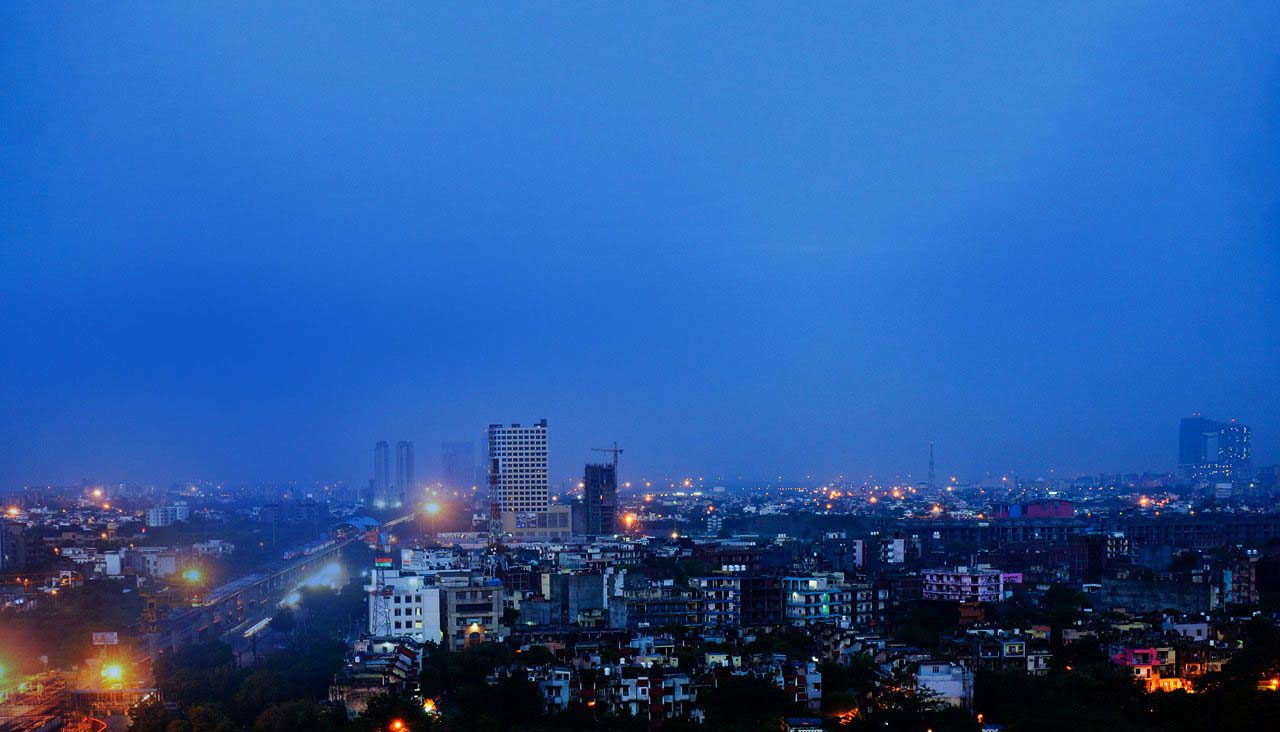
Our Achievements
27 years and counting: the Tata Power Solar
journey at a glance, a history rich with experience and achievements.
Know more
-
2024
Corporate Milestones
 Tata Power Renewable Energy Limited achieved a significant milestone by signing two MoUs with the Government of Tamil Nadu. The first MoU outlines plans to develop 10,000 MW of Renewable Energy Power Projects, creating potential investments of Rs 70,000 crores, generating 3,000 green jobs. The second MoU reinforces the commitment to expand the existing 4 GW Solar Cell and Solar Modules project in Tirunelveli District, with an additional investment of Rs 800 crores, further contributing to Tamil Nadu's clean energy transition. This collaboration with the Tamil Nadu government accelerates economic growth, generates jobs, and advances environmental sustainability, solidifying the state's leadership in India's clean energy transition.
Tata Power Renewable Energy Limited achieved a significant milestone by signing two MoUs with the Government of Tamil Nadu. The first MoU outlines plans to develop 10,000 MW of Renewable Energy Power Projects, creating potential investments of Rs 70,000 crores, generating 3,000 green jobs. The second MoU reinforces the commitment to expand the existing 4 GW Solar Cell and Solar Modules project in Tirunelveli District, with an additional investment of Rs 800 crores, further contributing to Tamil Nadu's clean energy transition. This collaboration with the Tamil Nadu government accelerates economic growth, generates jobs, and advances environmental sustainability, solidifying the state's leadership in India's clean energy transition.
-
2023
Corporate Milestones
- Launch of Mobile App for Rural Customers
 TP Renewable Microgrid Limited marked a historic milestone on Mahatma Gandhi Jayanti, October 2, 2023, by unveiling its ground breaking consumer mobile app. This eco-friendly initiative aligns with the company's commitment to clean and sustainable energy solutions. The app empowers users with features such as billing transparency, energy consumption monitoring, and valuable tips for maximizing renewable energy usage. With a user-friendly interface, seamless bill payments, and dedicated customer support, TP Renewable Microgrid Limited aims to advance Gandhiji's vision of a self-reliant and sustainable rural India, bringing us one step closer to a greener future.
TP Renewable Microgrid Limited marked a historic milestone on Mahatma Gandhi Jayanti, October 2, 2023, by unveiling its ground breaking consumer mobile app. This eco-friendly initiative aligns with the company's commitment to clean and sustainable energy solutions. The app empowers users with features such as billing transparency, energy consumption monitoring, and valuable tips for maximizing renewable energy usage. With a user-friendly interface, seamless bill payments, and dedicated customer support, TP Renewable Microgrid Limited aims to advance Gandhiji's vision of a self-reliant and sustainable rural India, bringing us one step closer to a greener future.
- Tata Power Renewable Energy Limited crossed 1.4 GW capacity of Group Captive Projects
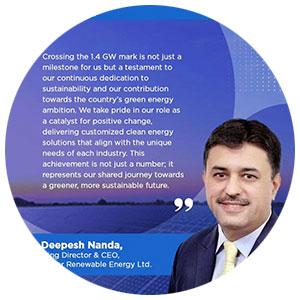 Tata Power Renewable Energy Limited (TPREL), a leading player in India's renewable energy sector, has achieved a significant milestone by surpassing 1.4 GW capacity in group captive projects within the last seven months. This success stems from the signing of Power Delivery Agreements with prominent industries, including Tata Steel, Tata Motors, Mukand Limited, Supreme Petrochem Limited, and others. Noteworthy collaborations also extend to constructing a 41MW captive solar plant for Tata Power's upcoming 4.3GW Solar manufacturing facility in Tamil Nadu, showcasing TPREL's commitment to sustainable energy solutions.
Tata Power Renewable Energy Limited (TPREL), a leading player in India's renewable energy sector, has achieved a significant milestone by surpassing 1.4 GW capacity in group captive projects within the last seven months. This success stems from the signing of Power Delivery Agreements with prominent industries, including Tata Steel, Tata Motors, Mukand Limited, Supreme Petrochem Limited, and others. Noteworthy collaborations also extend to constructing a 41MW captive solar plant for Tata Power's upcoming 4.3GW Solar manufacturing facility in Tamil Nadu, showcasing TPREL's commitment to sustainable energy solutions.
- Tata Power Solar honoured with Leading EPC (Engineering Procurement and Construction) at Renewable Energy India Award 2023
 Tata Power Solar has proudly received the Renewable Energy India Award 2023 for our outstanding 400 MW Solar Power Plant at Karnataka's Pavagada Solar Park. Recognized as a Leading EPC in the renewable energy sector, this accolade reinforces our commitment to operational excellence. Positioned at the forefront of innovation and project execution, it showcases our pivotal role in advancing towards a cleaner and greener energy future. This award underscores our leadership and dedication to providing cutting-edge solar solutions, solidifying our position as a trusted industry leader.
Tata Power Solar has proudly received the Renewable Energy India Award 2023 for our outstanding 400 MW Solar Power Plant at Karnataka's Pavagada Solar Park. Recognized as a Leading EPC in the renewable energy sector, this accolade reinforces our commitment to operational excellence. Positioned at the forefront of innovation and project execution, it showcases our pivotal role in advancing towards a cleaner and greener energy future. This award underscores our leadership and dedication to providing cutting-edge solar solutions, solidifying our position as a trusted industry leader.
-
2022
Corporate Milestones
- Partnership to Build a Skilled Workforce
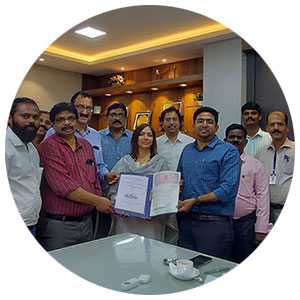 TP Solar Ltd has signed an MoU with the District Skill Training Office, Tirunelveli to enable local youth and women in the region, through skilling in multiple domain areas, in association with the company’s 4GW Cell and Module Manufacturing plant in Gangaikondan.
TP Solar Ltd has signed an MoU with the District Skill Training Office, Tirunelveli to enable local youth and women in the region, through skilling in multiple domain areas, in association with the company’s 4GW Cell and Module Manufacturing plant in Gangaikondan.
- India's First Mono Perc Cell handed over by Tata Power Solar
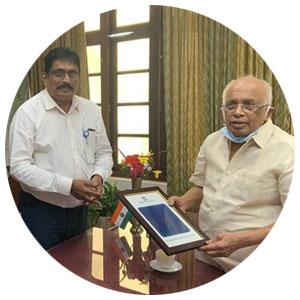 Tata Power Solar creates history by producing India's First Mono Perc Cell of 166mm & handed over the first cell to the Honourable Minister for Electricity, Kerala, Shri. K. Krishnankutty on 19th of October 2022. The event took place at Thiruvananthapuram Minister Office, Kerala to celebrate and appreciate the states’ commitment towards renewable energy and successful implementation of significant projects in Phases 1&2 of the KSEB (Kerala State Electricity Board) SOURA Rooftop Solar project. The state ministry applauds Tata Power Solar’s commitment and devotion to promote sustainable energy in the country. The ministry expresses its desire, that Tata Power Solar should participate in future green initiative projects like Solar Pumps, the Micro Hydro Project, and various ANERT projects.
Tata Power Solar creates history by producing India's First Mono Perc Cell of 166mm & handed over the first cell to the Honourable Minister for Electricity, Kerala, Shri. K. Krishnankutty on 19th of October 2022. The event took place at Thiruvananthapuram Minister Office, Kerala to celebrate and appreciate the states’ commitment towards renewable energy and successful implementation of significant projects in Phases 1&2 of the KSEB (Kerala State Electricity Board) SOURA Rooftop Solar project. The state ministry applauds Tata Power Solar’s commitment and devotion to promote sustainable energy in the country. The ministry expresses its desire, that Tata Power Solar should participate in future green initiative projects like Solar Pumps, the Micro Hydro Project, and various ANERT projects.
- A historic Win for Tata Power Solar
India's largest solar EPC order bagged by Tata Power Solar. Tata Power Solar steps forward in the mission to contribute to India’s sustainability goals by adding one of the biggest solar EPC projects to our name with SJVN Limited issuing LOA for the EPC order of 1GW for INR 5500 Cr. This EPC order has been designed keeping in mind the innovative use of ‘Make in India’ cells and modules. The project will be developed under the CPSU scheme of MNRE and will be completed within a period of 24months. Covering around 5000+ acres of land in Rajasthan, this project aims at reducing around 22,87,128kg of carbon emission and is expected to generate around 2500 million units annually.


